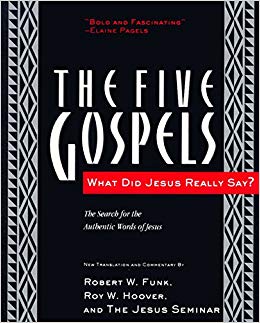Religion Prof James McGrath has a class on the historical Jesus in which he regularly pokes fun at the Jesus Seminar for supposedly attempting to decide the authentic words of Jesus by voting.
I have an activity that I run in my class on the historical Jesus, in which I get students to reenact what the Jesus Seminar became famous for doing at its meetings. The Jesus Seminar, for those who may not be familiar with it, produced a variation on the classic red letter editions of the Gospels. They voted as a group on which sayings of Jesus they consider authentic – the actual words of Jesus; which provided the gist but probably not something really close to what Jesus said; which may be in essence still true to the emphases of Jesus but owe more to the later church; and which are simply inauthentic. They voted using colored beads: red, pink, grey, and black. These correspond to the views on the authenticity of the saying in question listed above, so that the resulting edition still has “the very words of Jesus himself in red letters,” but very few of the sayings attributed to Jesus in the Gospels end up printed in that color.
I got students to do the same things, giving them a particular saying in its various forms across ancient sources, letting them debate, and then asking them to vote.
The especially “fun part” this time was that customized M&M’s were used:
This year, I took a step that I never did before. In the past I’ve simply had students bring M&Ms and we’ve decided what the regular colors would correspond to in the scale. This year, I placed an order for custom M&Ms for use in this activity. They are red, pink, grey, and black, and some of them say “Jesus SeM&Minar” on them!
McGrath’s idea has been taken up by another scholar, Keith Reich, who explains
The idea is to, Jesus Seminar style, vote on various sayings and/or deeds of Jesus as to their historical probability, but instead of using colored stones, one uses M&Ms. More fun, and hey, you get to eat your vote after you are finished.
McGrath hews to the point of making fun of the Jesus Seminar:
Then we vote, secretly, by dropping a colored M&M into a box with a hole cut in the top. We then tally the votes and figure out the average. (Students can also learn the useful skill of calculating their grade point average through this activity).
. . . . .
The Jesus Seminar, as far as I know, doesn’t get to eat the beads used for voting once that process is over, and so the case can be made that our way of doing things doesn’t merely imitate theirs, but is superior.
As if “truth” or “history” can be decided by a vote! Ha ha.
 One often sees the Jesus Seminar ridiculed in this way. So let’s give the Seminar a chance to explain itself.
One often sees the Jesus Seminar ridiculed in this way. So let’s give the Seminar a chance to explain itself.
The Jesus Seminar was organized under the auspices of the Westar Institute to renew the quest of the historical Jesus and to report the results of its research to more than a handful of gospel specialists. At its inception in 1985, thirty scholars took up the challenge. Eventually more than two hundred professionally trained specialists, called Fellows, joined the group. The Seminar met twice a year to debate technical papers that had been prepared and circulated in advance. At the close of debate on each agenda item, Fellows of the Seminar voted, using colored beads to indicate the degree of authenticity of Jesus’ words. Dropping colored beads into a box became the trademark of the Seminar and the brunt of attack for many elitist academic critics who deplored the public face of the Seminar.
(Funk, 34. Bolding in all quotations is my own)
What were the methods to be followed in those debates?
This was the rule the Fellows adopted:
• Canonical boundaries are irrelevant in critical assessments of the various sources of information about Jesus.
They refused, in other words, to privilege the gospels that came to be regarded as canonical by the church. The Seminar thus acted in accordance with the canons of historical inquiry.
(Funk, 35. Red text original)
So where did the voting come in? What was that all about? Continue reading “Should Scholars Vote? Mocking The Jesus Seminar / The Jesus SeM&Minar”

